- Home
- Anthony Burgess
The Clockwork Testament (Or: Enderby 's End)
The Clockwork Testament (Or: Enderby 's End) Read online
The Clockwork Testament (Or: Enderby 's End)
Anthony Burgess
Anthony Burgess
The Clockwork Testament (Or: Enderby 's End)
Anthony Burgess
The Clockwork Testament (Or: Enderby's End)
Book 3 of the Enderby Quartet
to Burt Lancaster
"… deserves to live, deserves to live."
ONE
The first thing he saw on waking was his lower denture on the floor, its groove encrusted with dried Dentisement, or it might be Orastik, Mouthficks, Gripdent, or Bite (called Bait in Tangier, where he could be said to have a sort of permanent, that is to say, if you could talk of permanency these days in anything, so to speak, address); the fully teethed in my audience will hardly conceive of the variety of denture adhesives on the market. His tongue, at once sprung into life horribly with no prelude of decent morning sluggishness, probed the lower gum briskly and found a diminution of yesterday's soreness. Then it settled into the neutral schwa position to await further directives. So. The denture, incrustations picked loose, laved, recharged with goo of Firmchew-family size with new wintergreen flavor-could be jammed in without serious twinge. As well, since today students must be met and talked at.
He lay, naked for the central heating, on his belly. If the bed, which was circular in shape, were a clock, then he was registering twenty of two, as Americans put it, meaning twenty to two. If, that was, his upper part were the hour hand. If, that was, twelve o'clock was where the bed touched the wall. The Great Bed of Ware of English legend had been round also, though much bigger, the radius being the length of a sleeper-say six feet. How many pairs of dirty (read Rabelaisian, rollicking) feet meeting at the center(re)? Circumference 2 pi r, was it? It didn't seem big enough somehow. But all the big things of European legend were smaller than you had been brought up to imagine. American scholars sorted that sort of thing out for you. Anybody could eat whole mediaeval sheep, being no bigger than rabbit. Suits of armor(our) would accommodate a twelve-year-old American girl. Not enough vitamins in roistering rollicking diet. Hell was originally a rubbish dump outside Jerusalem.
He lay naked also on a fast-drying nocturnal ejaculation, wonderful for man of your age, Enderby. What had the dream been that had conduced to wetness? Being driven in a closed car, muffled to the ears, in black spectacles, funeral sombrero, very pimply guffawing lout driving. Driven into slum street where twelve-year-old girls, Puerto Rican mostly, were playing with a ball. Wait, no, two balls, naturally. The girls jeered, showed themselves knickerless, provoked. He, Enderby, had to go on sitting in black and back of car while guffawing driver got out and ministered very rapidly to them all, their number of course changing all the time. Finnegans Wake, ladies and gentlemen, is false to the arithmetic of true dreams, number in that book being an immutable rigidity while, as we know, it is a mutable fluidity in our regular dreaming experience. There are seven biscuits, which you call er cookies, on a plate. You take away, say, two, and three remain. Or, of course, they could be what you call biscuits and we, I think, muffins. Principle is the same. I question that, said a sneering Christ of a student. Professor Enderby, asked a what Enderby took to be Polack, Nordic anyway, lacking eyelashes, please clarify your precise threshold of credibility.
This driver lout got through the lot, standing, with quick canine thrusts. Then Enderby was granted discharge and the entire scene, as in some story by that blind Argentinian he had been urged to read by somebody eager and halitotic in the Faculty Lounge, collapsed.
The bed he lay on, twenty of two, squinting down at his watch also on the floor, ten of eight of a New York February morning, was circular because of some philosophy of the regular tenant of the apartment, now on sabbatical and working on Thelma Garstang (1798-1842, bad poetess beaten to death by drunken husband, alleged anyway) in British Museum. The traditional quadrangular bed was male tyranny, or something. This regular tenant was, as well as being an academic, a woman novelist who wrote not very popular novels in which the male characters ended up being castrated. Then, it was implied, or so Enderby understood, not having read any of them, only having been told about them, they became considerate lovers eager for cunnilingus with their castratrices, but they were sneered at for being impotent. Well, he, unimpotent Enderby, temporary professor, would do nothing about cleaning that sperm stain from her circular mattress, ridiculous idea, must have cost a fortune.
Enderby had slept, as now he always did, with his upper denture in. It was a sort of response to the castrating aura of the apartment. He had also found it necessary to be ready for the telephone to ring at all hours, an edentulous chumble getting responses of Pardon me? if the call were a polite one, but if it were insulting or obscene or both, provoking derision. Most of the Serious Calls came from what was known as the Coast and were for his landlady. She was connected with some religiolesbic movement there and she had neglected to send a circular letter about her sabbatical. The insults and obscenities were usually meant for Enderby. He had written a very unwise article for a magazine, in which he said that he thought little of black literature because it tended to tendentiousness and that the Amerindians had shown no evidence of talent for anything except scalping and very inferior folk-craft. One of his callers, who had once termed him a toothless cocksucker (that toothlessness had been right, anyway, at that time anyway), was always threatening to bring a tomahawk to 91st Street and Columbus Avenue, which was where Enderby lodged. Also students would ring anonymously at deliberately awkward hours to revile him for his various faults-chauvinism, or some such thing; ignorance of literary figures important to the young; failure to see merit in their own free verse and gutter vocabulary. They would revile him also in class, of course, but not so freely as on the telephone. Everybody felt naked these days without the mediacy of a mode of mechanical communication.
Eight of eight. The telephone rang. Enderby decided to give it the honour of full dentition, so he jammed in the encrusted lower denture. Try it out. Gum still sorish. But, of course, that was the hardened Gripdent or whatever it was. He had them all.
"Professor Enderby?"
"Speaking."
"You don't know me, but this is just to inform you that both my husband and I consider that your film is filth."
"It's not my film. I only wrote the-"
"You have a lot to answer for, my husband says. Don't you think there's enough juvenile crime in our streets without filth like yours abetting it?"
"But it's not filth and it's not my-"
"Obscene filth. Let me inform you that my husband is six feet three and broad in proportion-"
"Is he a red Indian?"
"That's just the sort of cheap insult I would expect from a man capable of-"
"If you're going to send him round here, with or without tomahawk-"
She had put down the receiver. What he had been going to say was that there was twenty-four-hour armed protection in the apartment lobby as well as many closed-circuit television screens. This, however, would not help him if the enemies were within the block itself. That he had enemies in the block he knew-a gat-toothed black writer and his wife; a single woman with dogs who had objected to his mentioning in his magazine article the abundance of cockroaches in this part of Manhattan, as though it were a shameful family secret; a couple of fattish electronic guitarists who had smelt his loathing as they had gone up together once in the elevator. And there might be also others affronted by the film just this moment referred to.
Flashback. Into the bar-restaurant Enderby, exiled poet, ran in Tangier, film men had one day come. Kasbah location work or something of the kind. One of the film m
en, who had seemed and indeed proved to be big in his field, an American director considered for the brilliance of his visual invention quite as good as any director in Europe, said something about wanting to make, because of the visual possibilities, a shipwreck film. Enderby, behind bar and hence free to join in conversation without any imputation of insolence, having also British accent, said something about The Wreck of the Deutschland.
"Too many Kraut Kaput movies lately. Last days of Hitler, Joe Krankenhaus already working on Goebbels, then there was Visconti."
"A ship," said Enderby, "called the Deutschland. Hopkins wrote it."
"Al Hopkins?"
"G.M.," Enderby said, adding, "S.J."
"Never heard of him. Why does he want all those initials?"
"Five Franciscan nuns," Enderby said, "exiled from Germany because of the Falk Laws. 'On Saturday sailed from Bremen, American-outward-bound, take settler and seaman, tell men with women, two hundred souls in the round…' "
"He knows it all, by God. When?"
"1875. December 7th."
"Nuns," mused the famed director. "What were these laws?"
" 'Rhine refused them. Thames would ruin them,' " Enderby said. " 'Surf, snow, river and earth,' " he said, " 'gnashed.' "
"Totalitarian intolerance," the director's assistant and friend said. "Nuns beaten up in the streets. Habits torn off. Best done in flashback. The storm symbolic as well as real. What happens at the end?" he asked keenly Enderby.
"They all get wrecked in the Goodwin Sands. The Kentish Knock, to be precise. And then there's this final prayer. 'Let him easter in us, be a dayspring to the dimness of us, be a crimson-cresseted east…' "
"In movies," the director said kindly, as to a child, "you don't want too many words. You see that? It's what we call a visual medium. Two more double scatches on the racks."
"I know all about that," Enderby said with heat, pouring whisky sightlessly for these two men. "When they did my Pet Beast it became nothing but visual clichés. In Rome it was. Cinecittà. The bastard. But he's dead now."
"Who's dead?"
"Rawcliffe," Enderby said. "He used to own this place." The two men stared at him. "What I mean is," Enderby said, "that there was this film. Movie, you'd call it, ridiculous word. In Italian, L'Animal Binato. That was Son of the Beast from Outer Space. In English that is," he explained.
"But that," the director said, "was a small masterpiece. Alberto Formica, dead now poor bastard, well ahead of his time. The clichés were deliberate, it summed up a whole era. So." He looked at Enderby with new interest. "What did you say your name was? Rawcliffe? I always thought Rawcliffe was dead."
"Enderby," Enderby said. "Enderby the poet."
"You did the script, you say?" the assistant and friend said.
"I wrote The Pet Beast."
"Why," the director said, taking out a visiting card from among embossed instruments of international credit, "don't you write us a letter, the shipwreck story I mean, setting it all out?"
Enderby smiled knowingly, a poet but up to their little tricks. "I give you a film script for nothing," he said. "I've heard of this letter business before." The card read Melvin Schaumwein, Chisel Productions. "If I do you a script I shall want paying for it."
"How much?" said Mr. Schaumwein.
Enderby smiled. "A lot," he said. The money part of his brain grew suddenly delirious, lifelong abstainer fed with sudden gin. He trembled as with the prospect of sexual outrage. "A thousand dollars," he said. They stared at him. "There," he said. And then: "Somewhere in that region anyway. I'm not what you'd call a greedy man."
"We might manage five hundred," Schaumwein's assistant-friend said. "On delivery, of course. Provided that it's what might be termed satisfactory."
"Seven hundred and fifty," Enderby said. "I'm not what you'd call a greedy man."
"It's not an original," Mr. Schaumwein said. "You mentioned some guy called Hopkins that wrote the book. Who is he, where is he, who do I see about the rights?"
"Hopkins," Enderby said, "died in 1889. His poems were published in 1918. The Wreck of the Deutschland is out of copyright."
"I think," Mr. Schaumwein said carefully, "we'll have two more scatches on the racks."
What, after Mr. Schaumwein had gone back to the Kasbah and then presumably home to Chisel Productions, was to surprise Enderby was that the project was to be taken seriously presumably. For a letter came from the friend-assistant, name revealed as Martin Droeshout (familiar vaguely to Enderby in some vague picture connection or other), confirming that, for $750.00, Enderby would deliver a treatment for a film tentatively entitled The Wreck of the Deutschland, based on a story by Hopkins, which story their researchers had not been able to bring to light despite prolonged research, had Enderby got the name right, but it didn't matter as subject was in public domain. Enderby presumed that the word treatment was another word for shooting script (a lot of film men had been to his bar at one time or another, so the latter term was familiar to him). He had even looked at the shooting script of a film in which a heavy though not explicit sexual sequence had actually been shot, at midnight with spotlights and a humming generator truck, on the beach just near to his beach cafe-restaurant, La Belle Mer. So, while his boys snored or writhed sexually with each other during the siesta, he got down to typewriter-pecking out his cinematisation of a great poem, delighting in such curt visual directives as VLS, CU, and so on, though not always clearly understanding what they meant.
1. EXTERIOR NIGHT
Lightning lashes a rod on top of a church.
PRIEST'S VOICE: Yes. Yes. Yes.
2. INTERIOR NIGHT A CHURCH
Thunder rolls. A priest on his knees at the altar looks up, sweating. It is Fr. Hopkins, S.J.
FR. HOPKINS, S.J.: Thou heardest me truer than tongue confess Thy terror, O Christ, O God.
3. EXTERIOR NIGHT A STARLIT SKY
The camera pans slowly across lovely-asunder starlight.
4. EXTERIOR NIGHT THE GROUNDS OF A THEOLOGICAL SEMINARY
Father Hopkins, S.J., looks up ecstatically at all the firefolk sitting in the air and then kisses his hand at them.
5. EXTERIOR SUNSET THE DAPPLED-WITH-DAMSON WEST
Father Hopkins, S.J., kisses his hand at it.
6. INTERIOR DAY A REFECTORY
The scene begins with a CU of Irish stew being placed on a table by an ill-girt scullion. Then the camera pulls back to show priests talking vigorously.
PRIEST #1: These Falk Laws in Germany are abominable and totally sinful.
PRIEST #2: I hear that a group of Franciscan nuns are sailing to America next Saturday.
The voice of Father Hopkins, S.J., is heard from another part of the table.
HOPKINS (OS): Glory be to God for dappled things-For skies of couple-colour as a brinded cow…
The priests look at each other.
7. THE SAME TWO SHOT
Father Hopkins is talking earnestly to a very beautiful fellow-priest, who listens attentively.
HOPKINS: Since, though he is under the world's splendour and wonder, his mystery must be instressed, stressed…
FELLOW-PRIEST: I quite understand.
The camera pans rapidly back to the other two priests, who look at each other.
PRIEST #1: (sotto voce) Jesus Christ.
It worried Enderby a little, as he proceeded with his film version of the first part of the poem, that Hopkins should appear to be a bit cracked. There was also a problem in forcing a relevance between the first part and the second. Enderby, serving one morning abstractedly sloe gin to two customers, hit on a solution. "Sacrifice," he said suddenly. The customers took their sloe gins away to a far table. The idea being that Hopkins wanted to be Christ but that the tall nun, Gertrude, kindly became Christ for him, and that her sort of crucifixion on the Kentish Knock (sounded, he thought gloomily, like some rural sexual aberration) might conceivably be thought of as helping to bring our King back, oh, upon English souls.
12. EXTER
IOR DAY CU A SLOE
We see a lush-kept plush-capped sloe in a white well-kept priestly hand.
13. CU FATHER HOPKINS, S.J.
Hopkins, in very large close-up, mouths the sloe to flesh-burst. He shudders.
14. EXTERIOR DAY CALVARY
Christ is being nailed to the cross. Roman soldiers jeer.
15. RESUME 13.
Hopkins, still shuddering, looks down at the bitten sloe. The camera tracks on to it into CU. It dissolves into:
16. INTERIOR DAY A CHURCH
The hands of a priest hold up the host, which looks a bit like the sloe. It is, of course, Fr. Hopkins, S.J., saying mass.
17. THE SAME CU
In CU, Father Hopkins murmurs ecstatically.
HOPKINS: (ecstatically) Be adored among men, God, three-numbered form. Wring thy rebel, dogged in den, man's malice, with wrecking and storm.
18. EXTERIOR DAY A STORMY SEA
The Deutschland, American-outward-bound. Death on drum, and storms bugle his fame.
The second part was easier, mostly a business of copying out Hopkins' own what might be thought of as prophetic camera directions:
45. EXTERIOR DAY THE SEA
Wiry and white-fiery and whirlwind-swivelled snow spins to the widow-making unchilding unfathering deeps.

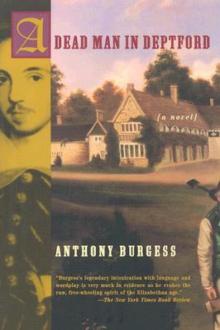 A Dead Man in Deptford
A Dead Man in Deptford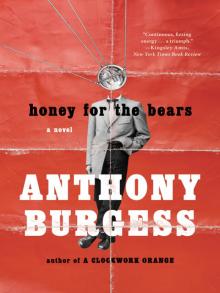 Honey for the Bears
Honey for the Bears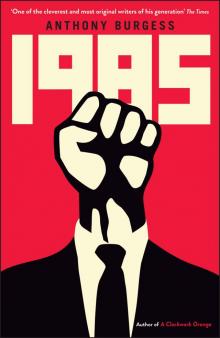 1985
1985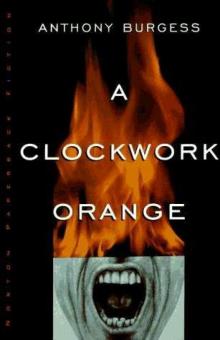 A Clockwork Orange
A Clockwork Orange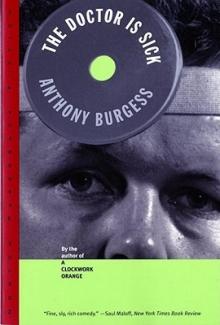 The Doctor Is Sick
The Doctor Is Sick Earthly Powers
Earthly Powers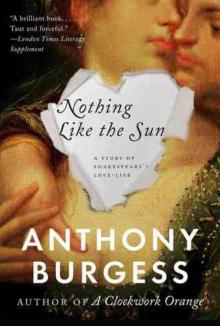 Nothing Like the Sun
Nothing Like the Sun Collected Poems
Collected Poems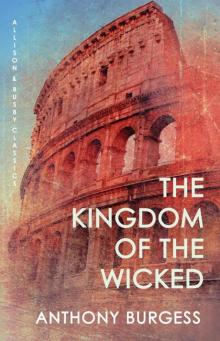 The Kingdom of the Wicked
The Kingdom of the Wicked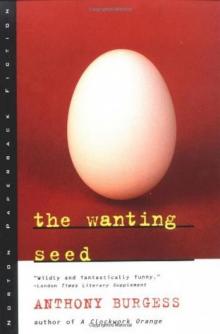 The Wanting Seed
The Wanting Seed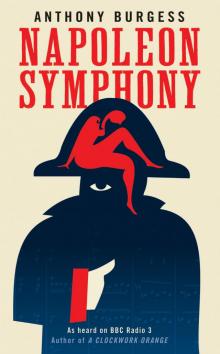 Napoleon Symphony
Napoleon Symphony The Malayan Trilogy
The Malayan Trilogy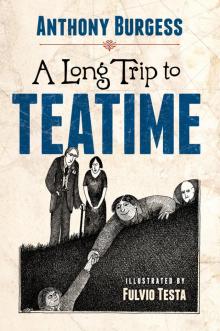 A Long Trip to Teatime
A Long Trip to Teatime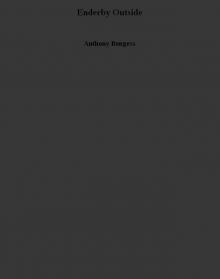 Enderby Outside
Enderby Outside M/F
M/F The Complete Enderby
The Complete Enderby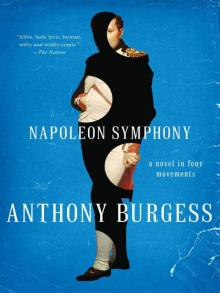 Napoleon Symphony: A Novel in Four Movements
Napoleon Symphony: A Novel in Four Movements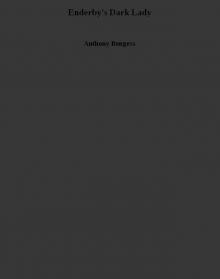 Enderby's Dark Lady
Enderby's Dark Lady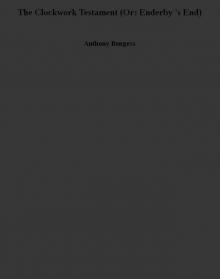 The Clockwork Testament (Or: Enderby 's End)
The Clockwork Testament (Or: Enderby 's End) ABBA ABBA
ABBA ABBA A Clockwork Orange (UK Version)
A Clockwork Orange (UK Version)